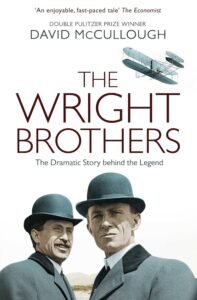“The Wright Brothers” by David McCullough is a detailed biography of Wilbur and Orville Wright, the brothers who are credited with inventing and building the world’s first successful airplane. McCullough delves into their backgrounds, their relentless experimentation, and the challenges they faced in achieving powered flight. The book highlights the importance of perseverance, ingenuity, and the supportive role of their sister, Katharine, in their success.

Key Takeaways:
1. Innovation Through Perseverance: The Wright brothers’ success was the result of years of dedication, experimentation, and overcoming repeated failures, demonstrating the value of persistence in achieving innovation.
2. Collaboration and Support: The collaboration between the brothers, along with the support of their sister, was crucial to their success, highlighting the importance of teamwork and family in achieving great things.
3. Scientific Curiosity: The brothers’ deep interest in science and mechanics, combined with their willingness to learn from both successes and failures, underscores the importance of curiosity and continuous learning in the pursuit of innovation.
4. The Impact of Belief: The Wright brothers were driven by a firm belief in their ability to succeed, even when others doubted them. Their confidence in their vision was key to pushing through challenges.
5. Legacy of the Wright Brothers: Their invention not only changed the course of history but also set the stage for the development of modern aviation, demonstrating the far-reaching impact of their work on future generations.






Discussion about this post